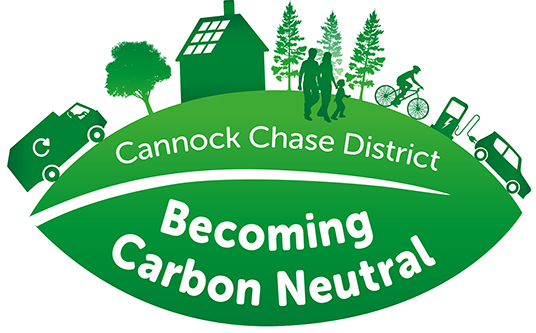
This is an introduction to the issue of Climate Change and what the Council is doing to combat it. It also provides links to the evidence/science and support available so the wider community can also play their part in reducing the impact of climate change and reduce their Greenhouse Gas (GHG) emissions.
What is the Council doing?
Cannock Chase Council declared a Climate Emergency in 2019 and set a vision for the District to become carbon neutral by 2030. Local authorities are directly responsible for a small percentage of the carbon dioxide (CO2) produced in their areas, but they nevertheless have an important role to play in encouraging their residents, businesses, and local organisations to achieve zero carbon targets.
The Council’s initial plans for tackling climate change include producing a costed action plan on how to achieve its carbon neutral vision. This Action Plan has now been published and the latest updates on the Council's next steps can be found here. You can downlod a copy of the Costed Action Plan below.
The Council is also in the process of creating a detailed baseline to assess the District’s current position. According to 2016 data from the Department of Business, Energy and Industrial Strategy, Cannock Chase District had the second lowest Carbon Emissions Per Capita (tonnes) in Staffordshire at 4.1. In 2005 it had been 6.3.
The single most significant carbon reduction event in the District in recent times has been the closure of the coal burning Rugeley Power Station in mid-2016. The electrification of the Chase rail line was another contributor to the reduction in CO2. Meanwhile, having the Cannock Chase Area of Outstanding Natural Beauty (AONB) in the District with its trees and forests helps absorb CO2 and potentially harmful gasses from the air and release oxygen.
Two initiatives in the District directly tackling climate change right now are Zero Carbon Rugeley/SLES (Smart Local Energy System) and Chase Community Solar
To find out further information about the actions the Council has taken over the last 18 months, read the 'what we have achieved so far' section below.
Also, find out more about how you can help tackle climate change - one small change could make a BIG difference. Watch a short video to find out how you can help tackle climate change
- The Council's Carbon Emissions for 2021/22
-
CCDC CO2e Emissions 2021/22
Scope
Emissions Type
Emissions
Percentage of Total Emissions
(tCO2e)
Scope 1
Heating & Fleet
409.06
20.80%
Scope 2
Electricity
215.06
11.00%
Scope 3
Water/Travel/Outsourced
1337.19
68.10%
Total Emissions
1,961.31
100%
- What we have achieved so far...
-
While the costed action plan was being prepared, Council officers have been working on several other climate related projects, with the aim of reducing both the organisations and districts CO2e emissions.
The document below provides some of the main areas of work that have been undertaken during this period.
Further information about some of these initiatives will be provided over the coming months.
Climate Change initiatives.pdf (113.13 KB)
- Small Change BIG Difference
-
What can you do?
A good way to start is to understand your own carbon footprint. This is the total amount of greenhouse gases (including carbon dioxide and methane) that are generated by your actions. The following tools will help you calculate your footprint and then decide what actions you can take to reduce it and therefore help protect our planet.
WWF - Footprint Calculator
Carbon FootprintThe rising cost of living is affecting us all. Changes to your energy use could also help in the fight against climate change. Find out more by visiting our 'cost of living' support page for further help and advice.
- The science and the evidence
-
It is now certain that human activities are resulting in a warming climate. Our anthropogenic GHG emissions can be seen in the data. Carbon Dioxide (the main GHG) at the turn of the industrial revolution was 280 ppm; it is now 400+ ppm.
- Royal Society
-
Some useful background information from the Royal Society exploring the evidence and the causes, with some helpful questions and answers.
Climate Change Evidence and Causes - Web page
Climate Change Evidence and Causes - PDF
Climate Change Q & A - PDF - UK Met Office
-
Information from the UK Met Office on climate change.
Weather and Climate Change
Climate Change Research
Climate Change Fact Sheets - IPCC (Intergovernmental Panel on Climate Change)
-
Information from the IPCC on climate change.
IPCC Home Page
IPCC Latest Report - AR5 - Synthesis Report Summary for Policymakers - PDF
IPCC Latest Report - AR5 - Full - PDF
